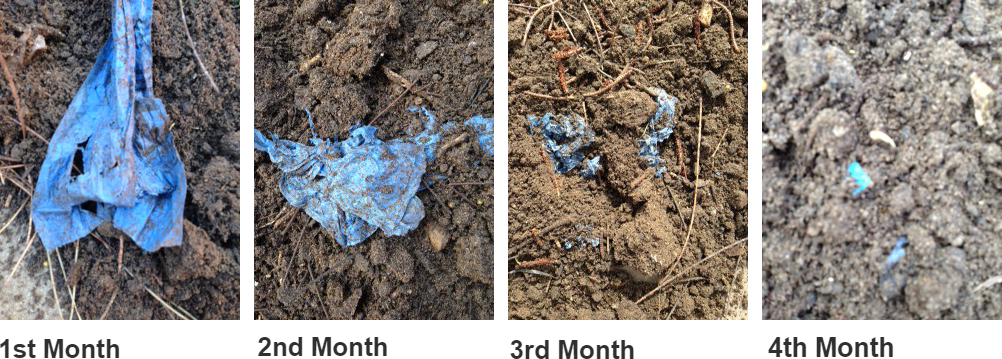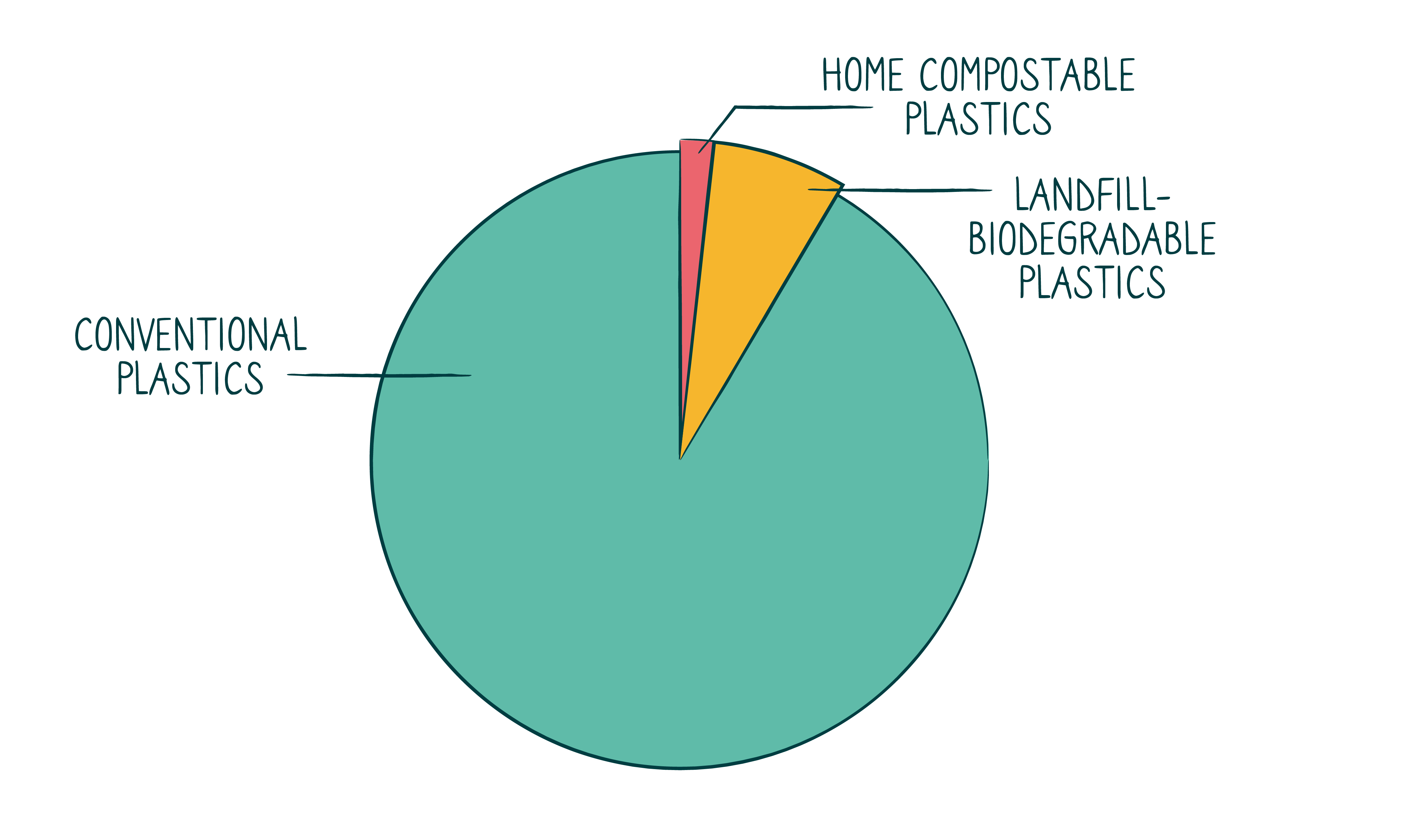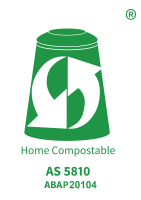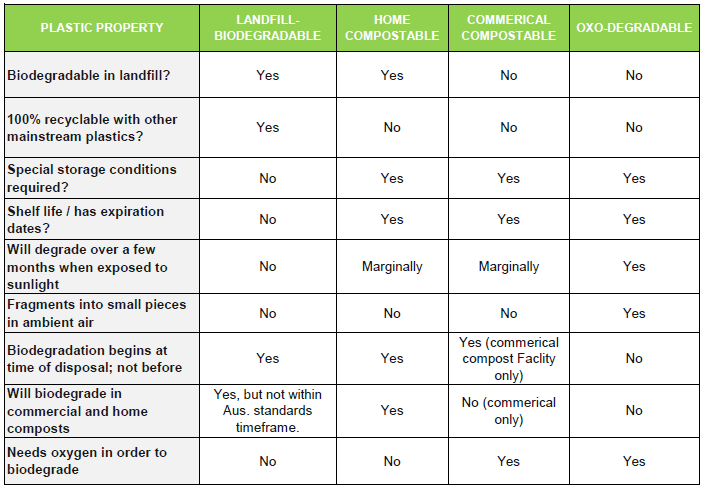Compostable Plastics
When it comes to compostable plastics, the two main choices are:
- Home Compostable
- Commercial Compostable
Biodegradation Time
Home Compostable
Similar to commercial compostable plastics, home compostable plastics have an extra component in them, PBAT* which is a highly biodegradable material. This allows home compostable products to biodegrade in cooler temperatures such as home compost bins or landfills. Their biodegradation rates are longer than commercial compost facilities but still relatively fast being several months up to 1-2 years depending on the plastic thickness.
Biogone’s home compostable products will biodegrade in a home compost, commercial compost facility (if the waste stream is available) or landfill. Certified for home compostability in accordance with Australian/NZ standard AS5810.
Benefits of home compostable products:
- Can be disposed of in a commercial compost facility (if available), home compost pile, or rubbish bin destined for landfill. They can also be disposed of in some council green bins where permitted. Enquire with your local council
- Will biodegrade in anaerobic conditions in a landfill. The latter condition allows their internal energy (methane) to be captured, which can also be used to generate electricity
Note: neither compostable nor home compostable plastics are recyclable. Their material will not mix with conventional plastics.
Biodegradation Test Results: Biogone Home Compostable Dog Poop Bag

*PBAT (polybutyrate adipate terephthalate) is a biodegradable random copolymer. The co-polymer is available commercially as resin and as a compound with PLA or starch. Today, the building blocks are made from petrochemicals. As a “drop-in” polymer, PBAT resembles LDPE in its properties. The flexibility and toughness of this polymer make it ideal for blending with another biodegradable polymer that is strong and rigid.
Commercial Compostable
These are bioplastics that biodegrade under commercial composting conditions as per AS4736.
Currently in Australia there are several limitations for commercial compostable plastics that make them not a sustainable option because:
- For a compostable plastic to biodegrade it must be in a commercial compost facility with temperatures of 60 deg C, plenty of oxygen and good moisture levels. If those conditions are not met, the compostable plastic will not biodegrade as the microorganisms need those conditions to live
- Due to their different composition, compostable plastics cannot be recycled in the mainstream soft plastics. Their materials have different properties and would contaminate other conventional plastics if they were mixed together. If they cannot be delivered to a commercial compost facility, they need to go to a landfill
- There are no separate recycling facilities that will sort out the compostable plastic from other plastic waste. This means by default a compostable plastic will generally go to a landfill where it will not biodegrade
- There are very few commercial compost facilities in Australia, making it very unlikely that commercially compostable plastic will ever be transported there
- When a commercially compostable plastic biodegrades its gaseous by-product is CO2, which cannot be used for energy capture methods to generate green electricity (as opposed to the CH4 generated from landfill-biodegradable plastics)
‘Compostable’ plastics are bioplastics made from:
- Bacteria produced plastics
- Plant-based materials
- Starch-based plastics
- Soy-based plastics
- Cellulose-based plastics
- Lignin based plastics
Compostable plastics are a subset of bioplastics that will biodegrade under specific composting conditions, hence not all bioplastics are compostable.
Bioplastics can be divided into 2 groups:
- Bio-based plastic that is biodegradable
- Bio-based plastic that is NOT biodegradable
To be considered ‘biodegradable’ means it can break down into the water, carbon dioxide, methane, and biomass in a given time frame (dependent on different standards).
This is where a lot of confusion exists, and “greenwashing”. Some people think that bioplastic will automatically be biodegradable, however, that is not the case. For example, polyethylene plastic can be made from sugar cane, but it is no more biodegradable than polyethylene made from petroleum.
Although the manufacturing of bioplastic materials is reliant upon petroleum as an energy and materials source, it is generally regarded as a more sustainable activity (due to carbon sequestration, as the plant grows) compared to petroleum-based plastics.
FAQs
Compare the plastic technologies
| Plastic Property | Landfill-Biodegradable | Home Compostable | Compostable | Oxo-Degradable |
|---|---|---|---|---|
| Biodegradable in landfills? | Yes | Yes | No | No |
| Recyclable with other mainstream plastics? | Yes | No | No | No |
| Special storage conditions required? | No | Yes | Yes | Yes |
| Shelf life / has expiration dates? | No | Yes | Yes | Yes |
| Will degrade over a few months when exposed to sunlight | No | Marginally | Marginally | Yes |
| Fragments into small pieces in ambient air | No | No | No | Yes |
| Biodegradation begins at time of disposal; not before | Yes | Yes | Yes, in Commercial compost facility only |
No |
| Will biodegrade in commercial and home composts | No | Yes | No, Commercial compost facility only |
No |
| Needs oxygen in order to biodegrade | No | No | Yes | Yes |




